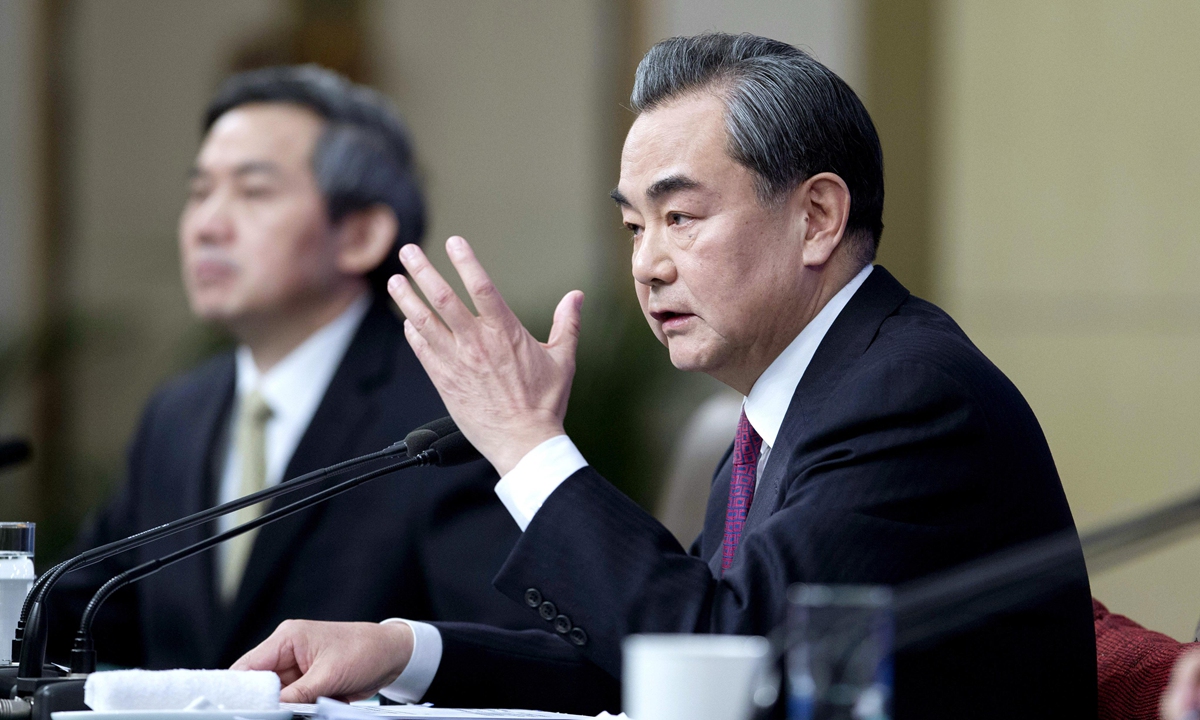FM Wang’s trip to the Philippines focuses on deepening trust ahead of Biden’s inauguration

Chinese State Councilor and Foreign Minister Wang Yi File photo: Xinhua
China’s State Councilor and Foreign Minister Wang Yi has arrived in the Philippines during his Southeast Asian visit, and aside from talking about cooperation on vaccines and regional recovery, South China Sea issues would also be important topics as the incoming Biden administration of the US may make more efforts to draw Southeast Asian countries, especially the Philippines, to challenge the waters, analysts said.
After visiting Myanmar, Indonesia and Brunei, Wang began his two-day visit in the Philippines on Friday. Details of Wang’s schedule have yet to be released on Friday, but media in the Philippines reported that Wang is expected to meet with President Rodrigo Duterte and Foreign Minister Teodoro Locsin.
“Cooperation on anti-virus and vaccines and how to work together for regional economic recovery would be the priorities for Wang’s meeting with leaders of the Philippines,” Chen Xiangmiao, an assistant research fellow at National Institute for South China Sea Studies, told the Global Times on Friday.
The Philippine government is working to get more vaccines considering the still increasing infections of COVID-19 globally. The country reported more than 496,000 cases as of press time on Friday, according to data from Johns Hopkins University. The Guardian reported that the Philippines has signed a deal for 25 million doses of vaccine from Chinese company Sinovac.
Through all these cooperation, the mutual trust between the two countries would be deepened, which would also help keep up the good momentum in solving South China Sea disputes via peaceful negotiations without interference from non-claimants, analysts said.
Chen Xiangmiao, an assistant research fellow at the National Institute for South China Sea Studies, told the Global Times on Friday that Joe Biden, who will become US President after his inauguration on January 20, will likely take a different strategy to contain China on the South China Sea.
Unlike Trump’s “extreme pressure” campaign on China over South China Sea issues, the Biden administration may look to seek a consensus with all claimants of the South China Sea on setting rules to contain China or cooperating with regional claimants to challenge China’s claims to the waters, Chen said.
Biden has already indicated the emphasis he places on the region with his choice of veteran diplomat Kurt Campbell for the newly created role of coordinator for Indo-Pacific affairs on the National Security Council (NSC), the Hong Kong-based South China Morning Post reported.
New challenges may emerge as the disputes among claimants still exist and due to increasing oil prices, some countries like Vietnam may take more measures in disputing the waters, Chen noted. But he still believes more countries will look toward solving South China Sea issues via cooperation and negotiations.
“The US’ so-called free navigation moves would continue under the Biden administration, but they would also try to avoid escalating military confrontations,” Chen said, noting that the situation in the South China Sea may remain tense since the US would never give up its competition with China in the area, nor would it give up disturbing negotiations and implementation of the Conduct of Parties in the South China Sea.
As a non-claimant, the US has continued to interfere in South China Sea issues. The Trump administration on Thursday imposed new sanctions on Chinese officials and their families; it also added China’s state oil company, the China National Offshore Oil Corporation, to a list of companies that US citizens are banned from doing business with. Pompeo announced the sanctions, AP reported.
It marked the latest move by the Trump administration to contain China with only five days before Inauguration Day in the US, when the world looks forward to seeing both Trump and Pompeo leave.
The US Commerce Department included 24 Chinese companies in its sanctions list using excuses like South China Sea issues in August, and more Chinese companies were added in September and December.
“The sanctions on Thursday are more like a political move that Trump made to create trouble for Biden in order to show his ‘superiority’ when confronting China and controlling the situation, since Trump still has eyes on 2024. Trump and Pompeo also want to further incite and cement anti-China sentiment in the US.”
Chen noted that the sanctions would have a limited impact on China. “For example, the China National Offshore Oil Corporation has developed its own technologies for its offshore drilling platforms,” Chen said.

